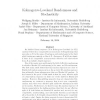Free Online Productivity Tools
i2Speak
i2Symbol
i2OCR
iTex2Img
iWeb2Print
iWeb2Shot
i2Type
iPdf2Split
iPdf2Merge
i2Bopomofo
i2Arabic
i2Style
i2Image
i2PDF
iLatex2Rtf
Sci2ools
STACS
2005
Springer
2005
Springer
Kolmogorov-Loveland Randomness and Stochasticity
An infinite binary sequence X is Kolmogorov-Loveland (or KL) random if there is no computable non-monotonic betting strategy that succeeds on X in the sense of having an unbounded gain in the limit while betting successively on bits of X. A sequence X is KL-stochastic if there is no computable non-monotonic selection rule that selects from X an infinite, biased sequence. One of the major open problems in the field of effective randomness is whether Martin-L¨of randomness is the same as KL-randomness. Our first main result states that KL-random sequences are close to Martin-L¨of random sequences in so far as every KL-random sequence has arbitrarily dense subsequences that are Martin-L¨of random. A key lemma in the proof of this result is that for every effective split of a KL-random sequence at least one of the halves is Martin-L¨of random. However, this splitting property does not characterize KLrandomness; we construct a sequence that is not even computably random such that...
Effective Split | Kl-random Sequence | Martin-L¨of Random | STACS 2005 | Theoretical Computer Science |
Related Content
| Added | 28 Jun 2010 |
| Updated | 28 Jun 2010 |
| Type | Conference |
| Year | 2005 |
| Where | STACS |
| Authors | Wolfgang Merkle, Joseph S. Miller, André Nies, Jan Reimann, Frank Stephan |
Comments (0)

